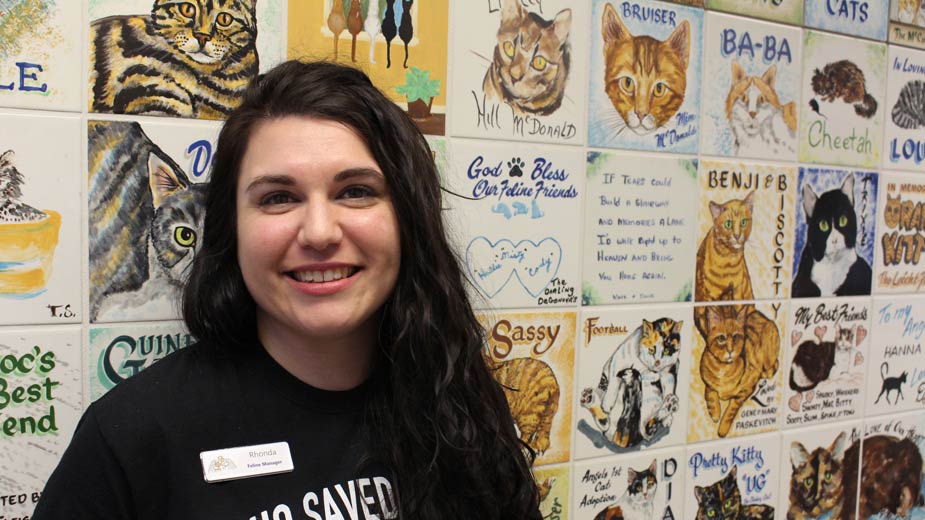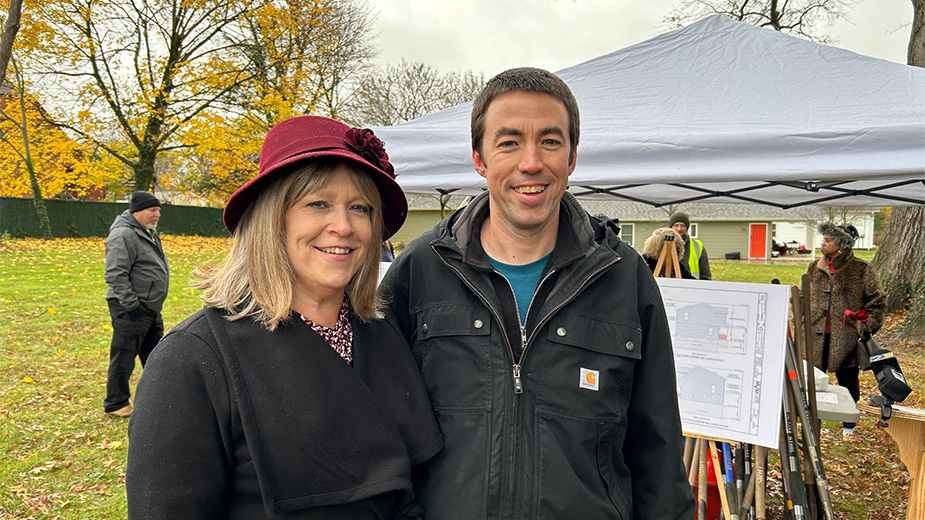At Angels for Animals, Pets Do the Choosing
CANFIELD, Ohio — More cats than people walk into and leave Rhonda Kratko’s office on any given day.
A friendly cat named McGregor languidly stares up at her as she explains the adoption program at Angels for Animals.
“As you can see, he is a big hunk of love,” she says.
Kratko is the cat manager at Angels and McGregor, an “office cat,” is just one of the 120 felines in the animal shelter, 4750 W. South Range Road, Canfield.
Angels, founded in 1990, is a nonprofit animal shelter that rescues, helps foster and promotes the adoption of pets. It provides animals with basic health services and offers those who would adopt its population education on their care and safety.
At any time, Angels has 100 to 120 cats in its shelter and up to 30 dogs.
“We have a pre-adoption form that everyone has to fill out,” says dog manager Sarah Sabol. “They can do it online or in person. It’s about three pages for both dogs and cats.”
Its staff also requires what they call “meet and greets” for prospective pet parents who already own an animal.
“If they have another dog or something, we require that they bring in that animal to assure that they get along before we send them into the home,” Sabol says.
Many clients assume that Angels earns a profit from adoptions. Not so, Sabol says.
“Every single one of our animals gets spayed or neutered, microchipped, dewormed and vaccinated,” she says. “It costs us roughly $200 to $300 an animal, and we usually charge $150 an animal. And those adoption fees go right back into all of the vet care that we do.”
Much of Angels’ operating budget comes from fundraisers and from its wellness clinic, which offers veterinary services to the public: vaccines, basic exams, flea, tick and heartworm medications and implanting microchips. The clinic is unable to perform X-rays or blood work.
On a typical day, Angels spays or neuters between 60 and 80 animals.
“We adopt out an average of 100 cats a month,” Kratko says. “Since I’ve been here, the most we’ve ever had adopted [in a month] is 130.”
An average of 10 dogs is adopted a week, but that’s never enough, Sabol says.
“I get 10 to 20 calls a day from people wanting to bring their dogs in – right now – to surrender,” she says.
Unlike dogs, all cats must first go through foster care before they can be adopted. There are between 200 and 275 cats in foster care, and “no one comes to the shelter floor before they’re 12 weeks old,” Kratko says.
All puppies must also go through foster care.
“Half of the staff here fosterers,” Kratko says. “Almost all of our volunteers foster, but we also reach out to the public.” She describes families who foster regularly as “our favorite kind of people. Our volunteers and our fosters are basically what make this place work.”
In the feline wing of the shelter are the cats and kittens to be claimed by those who have filled out adoption forms. They can interact with the kittens in three rooms, and anyone from the general public can interact with the older cats in three neighboring rooms.
The public can also interact with 25 or so cats ages 10 months to three years in the two-floor tree room. It has a large handmade tree where cats can sleep, play and climb from branch to branch.
Dogs in the canine wing are provided with their own cages, blankets, toys, food and water. An outside area is available for a one-on-one visit for those looking to interact directly with a dog before the adoption process begins.
Both Kratko and Sabol stress the difference between Angels for Animals and many pet stores.
“People can pay anywhere from $1,000 to $3,000 for a dog at some of these pet stores,” Sabol says. “Most of them are sick. Most of them aren’t really purebred.”
Adds Kratko, “Anything medically that happens in the first 14 days will be covered here in our wellness clinic. A pet store won’t do that.”
They also encourage people to adopt older pets, which often have fewer behavioral issues than their younger counterparts. Many older individuals adopt older pets for this very reason, says Sabol.
“They’re much easier to care for,” she says. “Most of the time they’re already potty-trained. They’re not going to rip your curtains if it’s a cat. And they’re not going to eat your furniture if they’re a dog.”
Angels pays the veterinary bills for families who are fostering and for those who adopt an animal. Angels will accept the return of an amimal from those, whatever their reasons, who are not able to keep it.
Many potential adopters come to Angels looking for a specific color or breed of animal, especially cats, that are far more plentiful at the shelter
“I hear all the time, ‘I’ve always wanted an orange kitten my entire life. Do you have any?’ Well, yes, we might have five orange kittens, but they need to choose you,” Kratko says. “You are going to walk into that room, and that orange kitten is probably going to be the only one who doesn’t approach you.”
Same-day adoption is available at Angels, but the staff recommends, if possible, that clients come in to meet an animal they might bond with, and then return the next day to see if they still have the same reaction.
“You need to let them choose you,” Kratko emphasizes.
One barrier for some potential pet parents is that Angels is adamantly against declawing cats. Any applicant who plans to declaw his pet cat is denied an adoption.
Angels sees its policy against declawing as part of a broader program of education.
“Declawing can completely change a cat’s personality,” Sabol says. “Its torture. A lot of people don’t know that. They’re not trying to be mean. They want to do the right thing.”
Angels wants to do more outreach in the community to explain animal care and issues such as declawing, especially with school-age children.
“You educate those kids, and they’re going to go home and tell their parents,” Sabol says.
Angels also host tours and education sessions for organizations such as the Boy Scouts. Those interested in hosting a presentation can call 330 549 1111.
“We have some programs where people can come here,” Kratko says. “Some are free of charge and some we ask for donations. But any fee that we get goes right back into the shelter, just to help educate people so they can be better pet owners and animal lovers.”
Pictured: Rhonda Kratko is the cat manager at Angels for Animals.
Copyright 2024 The Business Journal, Youngstown, Ohio.



